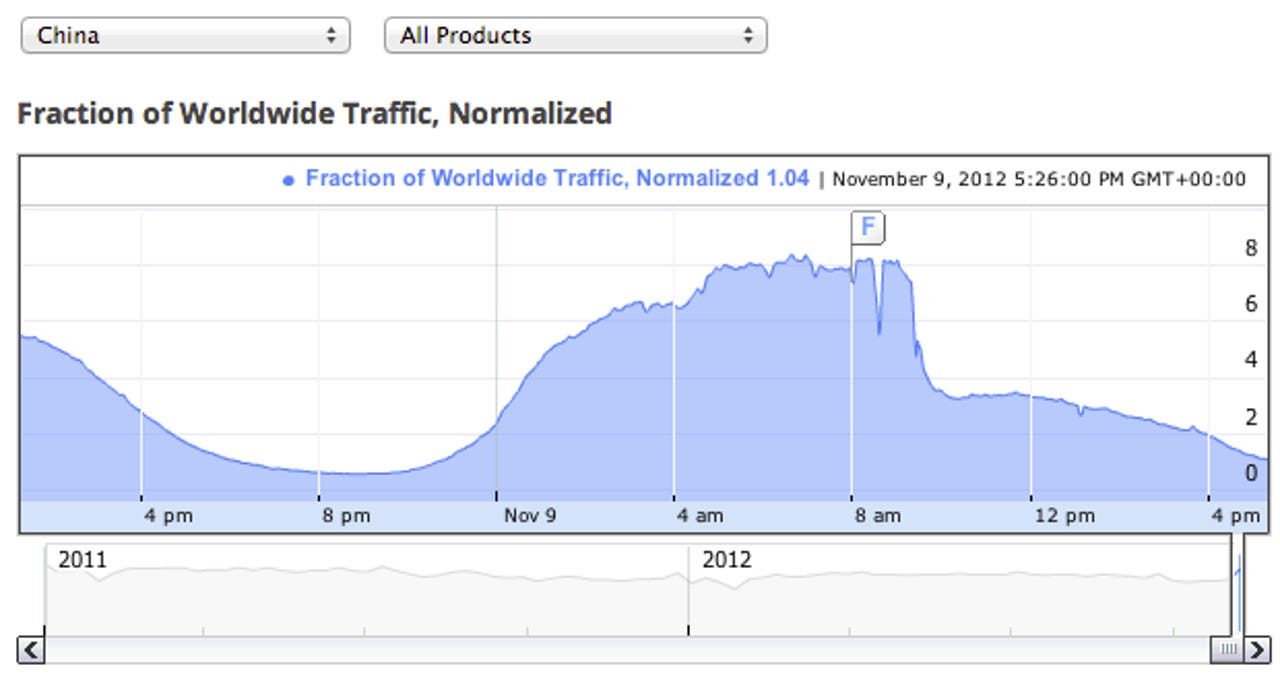Google services 'disrupted' in China; traffic declines rapidly


Chinese traffic to Google's Web services has declined rapidly over the past few hours, according to the search giant's Transparency Report, a service that outlines when governments may be disrupting Web traffic to the company's networks.
The latest data to the report -- seen in the image above -- does not show that all traffic has been blocked, nor does it suggest that the whole country is suffering from disruption in accessing Google's services, such as Google search and Gmail, however.
A Google spokesperson told The Wall Street Journal, who first reported the news: "We've checked and there's nothing wrong on our end," suggesting that the rapid decline in traffic may be as a result of China state Internet regulation rather than a networking or power outage.
A report by GreatFire.org, a service that monitors the Web traffic and site blocking in China, claims that Google's main page -- www.google.com -- along with Gmail, Google Maps, Google Analytics, and Android application store Google Play, are all being "currently DNS poisoned in China," leading to apparent widespread outages in the country.
The regulator's Google censorship status pages suggest that many popular Google services are under the attack, resulting in users being directed to a South Korean Web server that "doesn't serve any website at all."
The report suggests that as China's state ruling party is meeting to 'elect' -- the term used loosely -- its new party leadership may be the underlying reason as to why Google's services are blocked, despite global news agencies descending upon Beijing to report the event.
GreatFire.org said in a blog post:
The Communist Party of China is currently holding its 18th Party Congress in which new leaders of the party and the country are formally chosen. The fact that Google is blocked now is surely no coincidence. The big question is whether it will be unblocked again once the congress is over. We will closely monitor developments.
However, the report warns that this could be a move to a permanent shift in policy that could be "one step closer to fully separating the Chinanet from the Internet," the China Web monitoring service said in a separate tweet.
It comes only a couple of years after Google accused the Chinese government of hacking its networks, which led the search giant famously pulling out of the country altogether. Google relocated its search engine services to Hong Kong only a week before it left China altogether and shut down its Google China search engine, which now redirects users to its Google Hong Kong pages.
Facebook and Twitter are also barred from access in the country, but many state-owned or controlled services have popped up in order to replace the Western user-dominated services.
China has long been known for its "Great Firewall," which filters out content based on what the state ruling party does not want its citizens to see. That said, many circumvent the blocks by using proxy services and virtual private networking (VPN) services that bounce traffic through different countries where Web traffic is not restricted.
According to a report earlier this year, China's online population has rocketed to 538 million -- roughly 40 percent of the country's population of 1.34 billion residents -- up from 485 million in 2011, representing growth of about 11 percent year on year.